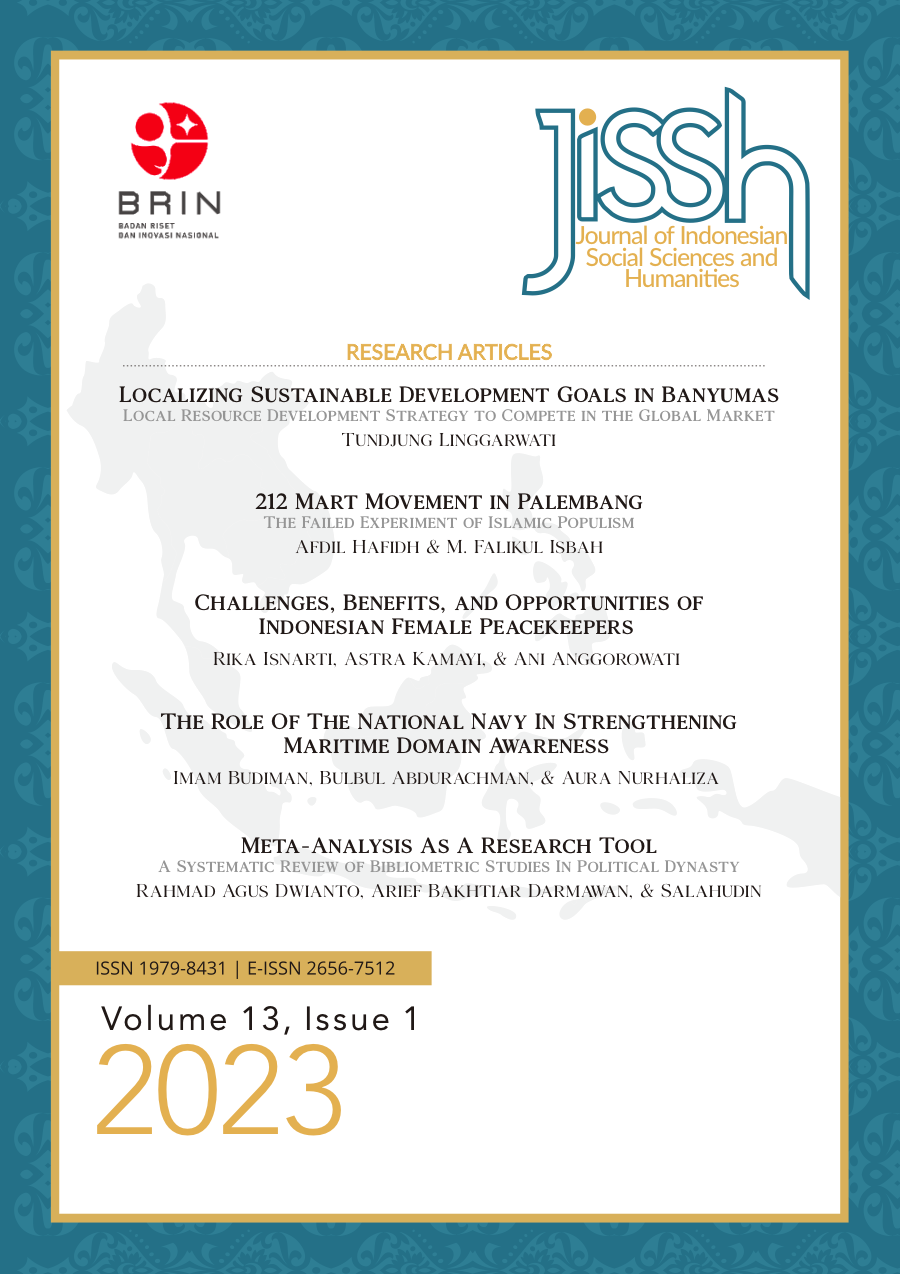212 Mart Movement In Palembang: The Failed Experiment of Islamic Populism
Keywords:
Islamic Populism Ideology, Socio-Economic Movement, Mobilization of People’s ResourcesAbstract
The case of blasphemy charges against Basuki Cahaya Purnama, also known as Ahok, in Jakarta in 2017 sparked a wave of mass protests, calling themselves the 212 Movement. Based on various criteria and characteristics, scholars have labeled it as an Islamic populist movement, which later inspired various articulations of the movement in different locations. This article explores the articulation of this movement in the economic field under the name 212 Mart in Palembang, South Sumatra. Using the framework of Social Movement Theory, there are two main findings. First, the 212 Mart movement attempts to articulate the ideology of Islamic populism as the framing of the movement through identity sentiments and the strengthening of the community’s economy. The ideology of Islamic populism positions the Muslim community as socially and economically marginalized. Second, the failure of the experimentation of Islamic populism in the 212 Mart movement is attributed to the weakening of economic opportunities and the structure of political opportunities. Thus, this article has contributed to studying Islamic populism through social movement theory by revealing the failure of the 212 Mart movement in Palembang.
References
Alhammadi, S., Alotaibi, K. O., & Hakam, D. F. (2020). Analysing Islamic banking ethical performance from Maqāid al-Sharī‘ah perspective: evidence from Indonesia. Journal of Sustainable Finance and Investment. https://doi.org/10.1080/20430795.2020.1848179
Arditi, B. (2007). Politics on the Edges of Liberalism, Difference, Populism, Revolution, Agitation. Edinburgh: Edinburgh University Press.
Amal, M. K., Damanhuri & Sahri, I. K. (2020). Islamic Populism and Democracy in Post-New Order Indonesia. Yogyakarta: Spasi Book.
Basya, M. H. (2019). Populisme Islam, Krisis Modal Sosial dan Tantangan Terhadap Demokrasi: Refleksi Pemilu 2019. Maarif, 14(1), 43–59. https://doi.org/10.47651/mrf.v14i1.48
Bayat, A. (2011). Post-Islamisme. Yogyakarta: LKiS.
Creswell, J. W. (2015). Research Design Pendekatan Kualitatif, Kuantitatif, dan Mixed. Jakarta: Pustaka Pelajar.
Fealy, G. (2016). Bigger than Ahok: Explaining the 2 December mass rally. Indonesia at Melbourne.
Hadiz, V. R. (2017). Indonesia’s year of democratic setbacks: towards a new phase of deepening illiberalism? Bulletin of Indonesian Economic Studies, 53(3), 261–278. https://doi.org/10.1080/00074918.2017.1410311
Hadiz, V. R. (2018). Imagine All the People? Mobilising Islamic Populism for Right-Wing Politics in Indonesia. Journal of Contemporary Asia, 48(4), 566–583. https://doi.org/10.1080/00472336.2018.1433225
Hadiz, V. R. (2019). Populisme Islam di Indonesia dan Timur Tengah. Jakarta: LP3ES
Hafidh, A. (2020). Gerakan Ekonomi 212 Mart di Palembang: Sebuah Eksperimentasi Populisme Islam yang Gagal. Thesis, Yogyakarta: Gadjah Mada University
Hafidh, A., & Lidya, E. (2019). Transformasi Usaha Berbasis Agama : Studi Kasus 212 Mart di Palembang. Empirika, 8364, 81–94. http://journalempirika.fisip.unsri.ac.id/index.php/empirika/article/view/75/pdf
Hamidi, L., & Worthington, A. C. (2021). How social is Islamic banking? Society and Business Review, 16(1), 51–70. https://doi.org/10.1108/SBR-03-2020-0036
Hassan, N. (2012). Islam Politik di Dunia Kontemporer: Konsep, Geneologi, dan Teori. Yogyakarta: SUKA-Press.Ichwan, Moch Nur. 2016. “MUI, Gerakan Islamis dan Umat Mengambang”, dalam Ma’arif Vol. 11 (2), Desember, 1-104
Laclau, E. (1977). Politics and Ideolog ’ y in Marxist Theory.
McAdam, Doug; McCarthy, John D.; & Zald, Mayer N (eds). 2004. Comparative Perspectivees on Social Movements: Political Opportunity, Mobilizing Structures, and Cultural Framing. Cambridge: Cambridge University Press
Madung, O. G. (2018). Populisme, Krisis Demokrasi dan Antagonisme”, Jurnal Ledalero, 17 (1) , 58-78.
Mietzner, M. (2020). Rival populisms and the democratic crisis in Indonesia: chauvinists, Islamists and technocrats. Australian Journal of International Affairs, 74(4), 420–438. https://doi.org/10.1080/10357718.2020.1725426
Mietzner, M., & Muhtadi, B. (2018). Explaining the 2016 Islamist Mobilisation in Indonesia : Religious Intolerance, Militant Groups and the Politics of Accommodation Explaining the 2016 Islamist Mobilisation in Indonesia: Religious Intolerance , Militant Groups and the Politics of Accommo. Asian Studies Review, 42 (3), 479–497. https://doi.org/10.1080/10357823.2018.1473335
Mudde, C. (2004). The Populist Zeitgeist. Government and Opposition, 39 (4), 541-563.
Perdana, A. A. (2017). Menguatnya Populisme: Trump, Brexit hingga FPI. Harian IndoPROGRESS, January, 1–10. https://indoprogress.com/2017/01/menguatnya-populisme-trump-brexit-hingga-fpi/
Religions, T. W. (2009). Routledge Handbook of. In Political Science. http://scholar.google.com
Kenny, P. D. (2017). Populism and Patronage Why Populism Win Elections in India, Asia, and Beyond. USA-OSO: Oxford University Press.
Kuru, A. T. (2007). Passive and Assertive Secularism: Historical Conditions, Ideological Struggles, and State Policies toward Religion. World Politics, 59(4), 568–594. https://doi.org/10.1353/wp.2008.0005
Palembang, B. P. S. K. (2021). Kota Palembang Dalam Angka 2021. Issn: 2527-9009, 43–52.
Situmorang, A. W. (2013). Gerakan Sosial: Teori dan Praktik. Yogyakarta: Pustaka Pelajar.
Sukmana, O. (2016). Konsep Dan Teori Gerakan Sosial. Malang: Intrans Publishing.
Wiktorowicz, Q. (2004). Islamic Activism A Social Movement Theory Approach. Bloomington: Indiana University Press.
Downloads
Published
Issue
Section
License

This work is licensed under a Creative Commons Attribution-ShareAlike 4.0 International License.
Authors who publish with this journal agree to the following terms:
1. Authors retain copyright and grant the journal right of first publication with the work simultaneously licensed under an Attribution-ShareAlike 4.0 International (CC BY-SA 4.0) license. This license allows others to remix, adapt, and build upon the work, as long as they credit the author and license their new creations under the same terms.
2. Authors may enter into separate, additional contractual arrangements for the non-exclusive distribution of the journal’s published version of the work (e.g., posting it to an institutional repository or including it in a book), provided there is an acknowledgment of its initial publication in this journal.
3. Authors are permitted and encouraged to post their work online (e.g., in institutional repositories or on their personal website) prior to and during the submission process, as this can lead to productive exchanges and increase citations of the published work (See The Effect of Open Access ).


















